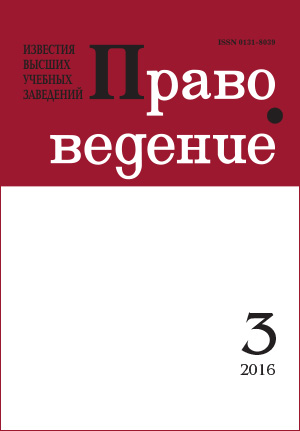The possessor of sovereignty
Abstract
The article is devoted to the key concept for both constitutional law and the theory of state — “the holder of sovereignty”. Special attention is paid to the peculiarities of the research methodology associated with this notion of theoretical perspective and practical nature. So, the author distinguishes between the essence and the exercise of sovereignty, as well as between the descriptive and the prescriptive points of view on its content. He emphasizes that the positivist epistemology imposes the choice of descriptive terms. However, in his opinion, the choice of the descriptive point of view is not a monopoly of the positivist epistemology. In his reasoning he proceeds from the classical classification of definitions of sovereignty proposed at the time by the leading French jurist Raymond Carré de Malberg. According to his concept, the first value of sovereignty indicates the highest level occupied by a public authority. Its second meaning is synonymous with the public authority itself. Finally, the third value is associated with the position held by the highest tactical power holder, i.e. by a specific body. The author agrees with Сarré de Malberg that the differences between the values of sovereignty will allow us to discover its “true nature”. However, he notes that they have a more obvious advantage, as they allow to understand why judgments usually related to sovereignty and seemingly incompatible, are allowed within the same legal discourse. To solve this problem, the author considers the issue of indivisibility of sovereignty and complements the classification of its values with two more values. Under the new classification he establishes the relationship between the organization of power and the use of the theory of sovereignty in the discourse of the rulers with respect to sovereignty in general and to a particular theory of sovereignty. In conclusion, the author states that in the contemporary discourse about constitutional justice the reference to the sovereignty of the people or the nation is likely to disappear, and any argument of the holder of sovereignty becomes useless. Thus, it appears problematic to combine constitutional justice and democracy viewed as a form of government of the sovereign people.
Keywords:
holder of sovereignty, state, authority, Parliament, people, representative, constitution, rule, positivism, theory, constitutional control, democracy
Downloads
References
Downloads
Published
How to Cite
Issue
Section
License
Articles of "Pravovedenie" are open access distributed under the terms of the License Agreement with Saint Petersburg State University, which permits to the authors unrestricted distribution and self-archiving free of charge.




